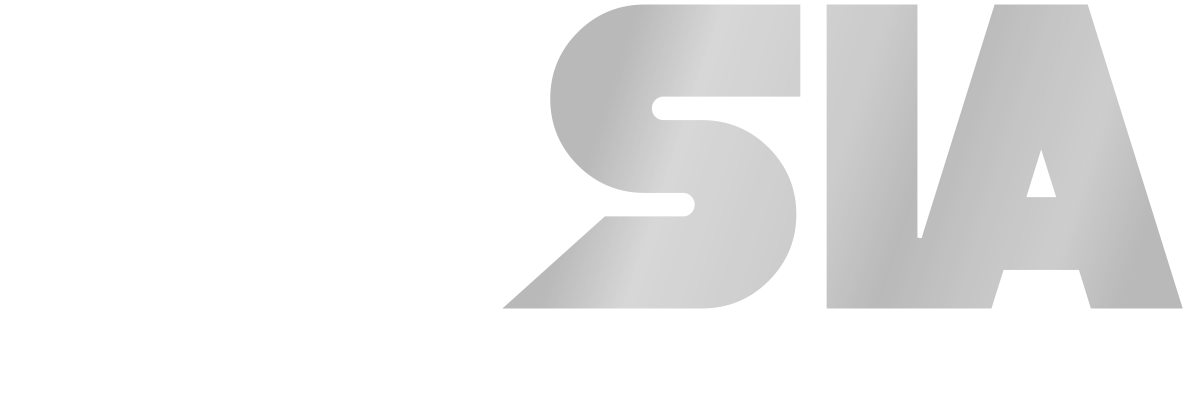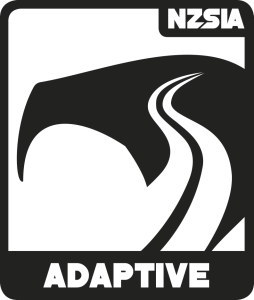Learning to Turn with Mono-Ski
 What, Who, How
What, Who, How
What
Mono-skiing involves skiing the mountain using a mono-ski. It can be done anywhere on the mountain from the beginner slope through to the most advanced runs.
Who
Anyone who can do a balanced straight run in a mono-ski with a flat ski.
How
The Wedgeless Progression is used for learning to mono-ski with an emphasis on a flat ski with rotational movement.

 Movements & Performance
Movements & Performance
Balance/Stance
In a centred stance, the pelvis is tilted forward and square to the ski, the knee joint is flexed, and there is room for the chest to move towards the knees. The outrigger shaft passes the leg about mid-thigh with the elbows out from the body. In this position, the outrigger ski tips should be lightly touching the snow. The ski is flat on the snow.
If the skier has limited control of their trunk, it can be supported with a higher-backed seat and/or additional strapping. During the early stages of learning, it may be useful to lightly bucket the skier to prevent falling or collision. Ensure your assistance does not affect the student’s movements and ability to find balance. After a fall, check the skier’s stance and adjust if required.
Rotational
Learning to turn initially is best achieved without technical discussion. Have the student look in the direction they want to turn and point both outriggers in that direction. A follow-me approach with the instructor facing the student helps. As much as possible, the whole body should move as a block with the eyes looking in the direction of the turn. To keep the ski flat, rotational movement at this stage must happen around the vertical axis.
After the skier has begun making turns, work with them to become aware of the part of their body that is twisting. Rotational movements should come from the lowest functional part of the body, so work towards this goal. Where someone can aid a twist of their trunk with movement in their legs, this should be encouraged. When turning is difficult, the claw of the inside outrigger can also be used to create a point of friction around which the skier can rotate. Be aware that this may encourage poor movement patterns so teach this move with discretion and aim to reduce it as much as possible. A leading inside outrigger can assist in stabilising the upper body which allows the lower body to turn underneath. The outside outrigger should also actively move with the turn.
Edging
The focus in learning is on keeping the ski flat at the initiation and control phase of the turn. At turn completion when the ski is across the hill, the skier sits in the centred stance with the angle of the slope creating sufficient edge angle. A traverse is a good way to teach this.
Pressure Control Movements
The skier should be encouraged to move forward with the ski to maintain a centred stance. If this stance results in limited pressure on the tip of the ski at run initiation, check the setup with a dowel test and consider moving the seat/frame forward on the ski.
 Terrain, Equipment & Safety
Terrain, Equipment & Safety
Terrain
Use a learners area with as much width as possible to allow space for the activities.
Equipment
All movements are transferred through the seat to the ski so the seat can be considered in the same way as a boot. Equipment set up is critical and many issues a student might have often come back to incorrect set up. Dowel test students on their equipment. Canting can be used in the seat to fill the voids in order to have a flat ski when the student is in their centred stance. Take your time and recheck from time to time especially if there is a change in performance.
Safety
- Helmets are essential.
- Ensure there are no pressure points from insufficient padding, objects in the seat or in pockets, twisted straps and buckles, or over tightening of the straps.
- Monitor temperature for overheating, hypothermia, and for frostbite.
- Ensure there is no pinching of any catheter tubes, or pressure on a colostomy bag if either of these are present.
- Follow safe chairlift loading/unloading practice.
- Bucket the mono-ski in crowded areas if the user has insufficient skill to manoeuvre safely.
- Teach the mono skier to fall with their outrigger forward and across the body to protect the shoulder joint.
 Corrective Teaching
Corrective Teaching
Student struggles to rotate the ski to create a direction change:
Skier over rotates during the turn:
Skier is unable to link turns:

